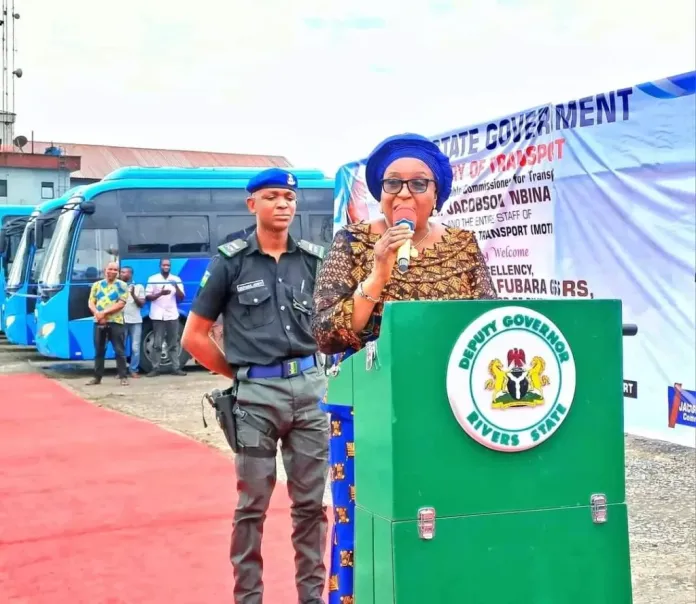Editorial
Subsidy Removal: Sustaining The Palliatives In Rivers

As indigenes and inhabitants of Rivers State grapple with the consequential impacts of the fuel subsidy withdrawal, Governor Siminalayi Fubara has initiated the deployment of 17 high-end buses for intrastate transportation. This measure aims to assuage the pernicious repercussions commuters in the State are currently dealing with following exorbitant fares.
Speaking during the flag-off at the Rivers State Transport Company complex in Port Harcourt, Governor Fubara maintained that the state government, under his watch, was aware of and concerned about the difficulties produced by fuel subsidy eradication. This necessitated the intervention.
Unveiling the buses in Port Harcourt last Tuesday, Fubara, who was represented by his Deputy, Prof. Ngozi Odu, said the buses would convey commuters on designated major routes in the state capital and beyond. He disclosed that the subsidy intervention luxury buses fulfilled a promise he made to organised labour recently.
He declared, “I am indeed very delighted to perform the flag-off ceremony of the Rivers State Government mass transit system. The Rivers State Government is aware and concerned about the economic challenges faced by the populace as a result of the removal of fuel subsidy.
“Consequently, this scheme flagged off today, is a deliberate intervention by the Rivers State Government to mitigate these economic challenges. Therefore, it is a gift given to us, and we must treasure it”.
Shortly after President Bola Tinubu announced the withdrawal of fuel subsidy during his inauguration on May 29, transport fares in Rivers State, specifically within the capital city of Port Harcourt, rose by a 100 per cent and more along many routes. Besides the upsurge in consumer goods prices, many commuters find it difficult to commute to and from work.
The consternation about this intervention is its celerity; how the government brought in the scheme a few weeks after the subsidy withdrawal. There is no other State in Nigeria where this has happened. Kudos to the administration. Many thought the project would take a longer period than expected. It demonstrates how committed and responsive the governor is to the people’s predicament.
The well-conceived and well-received palliative will aid numerous individuals in the State in dealing with subsidy removal’s painful effects. Commuting to work and transporting children to school has become excessively burdensome, which explains why the intervention is broadly welcomed. Even political opponents of the government cannot provide compelling reasons for opposing this meritorious project.
Free bus policy improves mobility for vulnerable segments of society. We strongly urge the state government to maintain substantial support for the Rivers public as Nigeria permanently shifts to the post-fuel subsidy regime. Additional measures should be taken to enhance convenience for the people and foster sustainable economic growth.
In times of national emergency, the government must show its benevolence. The transportation industry plays a significant role in such situations. However, it is implausible for the government to carry the burden alone. Therefore, it is essential to charge a nominal fare for the management and upkeep of these subsidy palliative vehicles.
While the programme is valuable, its sustainability is crucial when assessing its effectiveness and public impact. The government can generate employment opportunities for young individuals through this initiative. A shared concern is that the commuting public must contribute by maintaining orderliness while utilising the free bus service. This is to ensure the government’s vision succeeds.
It is widely acknowledged that rural communities experience critical public transport challenges. Accordingly, it is necessary to implement free buses in such localities, considering the complexities associated with securing funding, the restricted frequency of service, and the lack of accessibility compared to urban public transportation. In essence, this endeavour should not be restricted to urban centres alone.
Choosing the Rivers State Transport Company (RTC) as the location for the launch of the free bus service highlights the necessity of reviving this dormant enterprise. The dire condition of the state-owned transport company has precipitated apprehensions among residents, who are dissatisfied with its prolonged closure. The government’s failure to reopen the RTC has left citizens at the mercy of privately owned transport companies. This has denied many their rightful job opportunities.
Besides serving as a palliative for the less privileged in the State, the long-term goal of this valuable strategy should be to make the state a habitable place where most car owners will not see the need to put their cars on the road during business hours, as they can rely on well-structured and coordinated Rivers bus services to transport them to their desired stations.
Editorial
Beginning A New Dawn At RSNC

Editorial
Sustaining OBALGA’s Ban On Street Trading

Editorial
AFCON ’25: Bravo, Super Eagles, But…

-

 Sports5 days ago
Sports5 days ago2026 WC: Nigeria, DR Congo Awaits FIFA Verdict Today
-
Politics5 days ago
ADC, PDP, LP Missing As INEC Set For By- Elections In Rivers
-

 Environment5 days ago
Environment5 days agoOxfam, partners celebrate 5 years of climate governance programmes in Nigeria
-
Politics5 days ago
FG’s Economic Policies Not Working – APC Chieftain
-

 News4 days ago
News4 days agoVictory Over Insurgency Certain, Tinubu Assures
-

 Politics5 days ago
Politics5 days ago2027: Diri Unveils RHA LG Coordinators, APC Congress Panel
-

 Politics5 days ago
Politics5 days agoReps To Meet,’Morrow Over INEC’s 2027 Election Timetable
-

 Politics5 days ago
Politics5 days agoGroup Continues Push For Real Time Election Results Transmission

